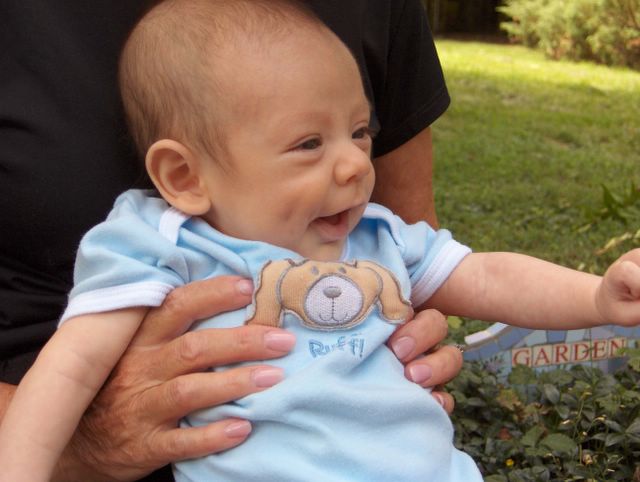 She called us first on Sunday, but we missed the call and had to call her back. She wasn't home, so we left a message and she called us back but we were out. We called again, and she called again and we called back until finally we broke through the maddening phone tag and she could make her announcement: "He arrived!" she yelled. "He was early, but he's beautiful." Karla had a baby.
She called us first on Sunday, but we missed the call and had to call her back. She wasn't home, so we left a message and she called us back but we were out. We called again, and she called again and we called back until finally we broke through the maddening phone tag and she could make her announcement: "He arrived!" she yelled. "He was early, but he's beautiful." Karla had a baby. We danced, we cried, we celebrated. It was a glorious day. How big is he, how much does he weigh? When did he come? We wanted to ask every question we could think of. We wanted to fly down and hold him and love him and welcome him into the world. It was the best, it was the finest, it was the greatest news.
But at the same time that she called we were also watching the TV news.
At one level I can't understand why people have babies. In a world so full of heartache and hate and oppression, what meaning can there be in a young couple who want to defy global reports and believe in birthing life in the midst of carnage? The future is so unsure. The potential for disaster is so high. The inevitability of sorrow so certain. But magically and mysteriously, people seem to have an innate spiritual urge to look at each other with hope and love and awe and believe that one more new child in the world will be a good thing.
In my ministry I have known countless people who were ill or old or hurt or lonely. Often they are courageous people, whose strength has humbled me. Scarred, diseased, or abandoned. Some of them have been in tremendous pain. Life is just fragile, and it's frail, and at any minute it can be taken away from any of us. On the face of it, then, what real logic, what real meaning, is there in propagating the species at all? And yet, Karla had a baby.
Is it a statement of faith? A proclamation of hope? A claim that the future can be sustained by love? Who knows. There's no accounting for faith. There's no reality-based reason for it anymore. Most of us in the west no longer have children to work the farms for us. Or to take care of us in our old age. There's no practical need. No sensible need. No financial need. But, still we do it: with a mysterious, irrational, built-in belief that love is worth gambling on and that tomorrow can be better than today, people have babies. How can you explain that?
Perhaps God, in a burst of whimsy and inspiration, built into the DNA of human creation, the suspicion that love can trump fear. Perhaps God created us to defy logic and live as though hope is in fact rational. Perhaps it is one part of the mysterious and elusive gift of grace, that God gives to us the ability to see what facts deny: that life is worth living, that love is worth sharing, and babies are worth birthing.
There's no data to back up hope. No explanation for it. Life itself creaks along, turning and twisting with peaks and valleys, toward an ultimate end. Under the best of situations it is full of slips and falls, and accidents and diseases, that finally take us down. Under the worst of situations it can be riddled with hunger, oppression, war and death. There are joys along the way, but from a market-based, cost-benefit analysis, nobody gets out alive and in the end we all lose. So why try? Why love? Why keep going?
And yet, Karla had a baby.